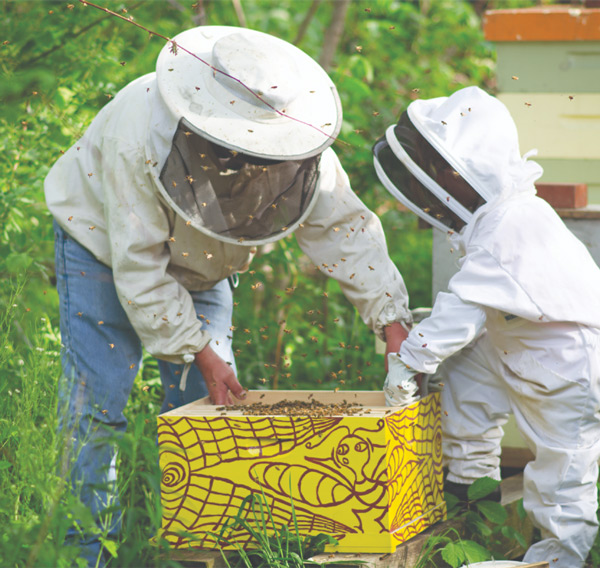
Why Become a Beekeeper?
This gratifying pastime offers plenty of benefits that extend beyond honey. Many beekeepers enjoy the personal connection to nature and living things, while others appreciate being part of the beekeeping community. Your garden and neighborhood plants benefit, too: As they search for food, the bees from your hive are pollinating plants within at least a two mile radius, helping plants produce fruits, vegetables, nuts and seeds. Explore these seven benefits of becoming a beekeeper.
1. There’s always something exciting happening in the hive
Beekeepers are constantly learning: Flight patterns, comb-building habits, bee communication, bee lining, and brood-rearing are just some of the many fascinating topics you’ll learn about through keeping bees. A colony is a living organism, with every bee from the newest worker to the all-important queen operating together in harmony. Even in winter, you can listen for the gentle hum inside the hive that lets you know they’re active. You’ll learn from observing your bees at work, and learn year-round through virtual or in-person classes and beekeeping books. There’s no end to what you’ll find as you raise these fascinating fliers.
2. Just about anyone can keep bees
People of all ages can enjoy beekeeping, and it’s accessible to almost anyone who is willing to put in the time and effort. Years ago, beekeepers had to learn carpentry just to build their own hive. Now, you can buy complete beekeeping kits and beekeeping supplies from many companies.
Beekeeping isn’t limited by location: You can plan an apiary based on your space whether you live in a rural, suburban, or urban setting. For hive equipment, there are lighter-weight options, and you can alter existing hives to suit your needs. The heaviest weight you may need to lift could be as low as 10 lbs., or one deep frame of honey.
3. Be part of an active beekeeping community
When you become a beekeeper, you can learn from others who enjoy bees as much as you do. Your fellow beekeepers possess a wealth of information; look to them as you learn about honey bee care. Connect with the beekeeping community through social media, and find your nearest beekeeping club or association. Clubs often have loaner honey extractors, veils and other equipment available for members to borrow. Clubs often arrange for mentors, too!
4. Beekeeping helps you become a better gardener
The benefits of apiculture extend to local agriculture. Aside from their master pollination skills, bees are fantastic teachers. Many of the lessons you learn about honey bee care apply to plants as well. Beekeepers must pay close attention to the weather conditions and make hive adjustments, which translates to improving weather-related care for crops. Beekeeping also teaches you how to identify beneficial and unfriendly insects, and proper pesticide use, which will also help you manage the health of your garden. Plugging into the worlds of beekeeping and gardening at the same time will keep you totally in tune with the natural world around you.
5. Urban beekeeping impacts the neighborhood ecosystem
Urban beekeepers are setting up hives in residential and city areas that once seemed inhospitable to honey bees. With some extra considerations for bee and human safety, urban bees can thrive. Urban beekeeping brings nature closer, so you can enjoy a little bit of serenity in the middle of busy city life. Your bees can improve the neighborhood’s ecosystem as they pollinate plants in parks and gardens, which promotes fruiting and seed production. Community garden members may provide space for hives because they’ll reap benefits, too.
6. Harvest beeswax and other products of the hive
Though most people think first about honey from the hive, beeswax is valuable as well. Wax is produced by young worker bees when building honeycomb. Once rendered—melted and filtered—beeswax can be used to products for use at home use, to give as gifts, or to include on your sales table:
- Lotions, lip balms, soap, and other skincare products.
- Wax food wraps, wood furniture polish or cutting board conditioner.
- Beeswax candles from simple tapers and votives to detailed molded candle designs that look hand-carved.
- Because it contains few skin irritants and has a few antimicrobial compounds, beeswax is a favorite ingredient in beauty products, especially for people with sensitive skin.
7. The most popular benefit of keeping bees: the honey
Last but not least, beekeeping yields the most delicious reward: raw honey, straight from your own hives. It takes patience and dedication to your colony to get it—but the result is worth the effort. Add it to your tea or toast, use it in place of sugar, or eat it straight from the comb. If you collect a large amount of honey, don’t worry: it never expires. Once it’s jarred, keep it tightly sealed and it’ll be ready when you need it. Honey and honey products are always popular at the farmers market. Sell the honey and beeswax products you produce to the people who prefer to buy from local vendors. Package and store your product in our honey bottles or cut comb honey containers, and include pre-printed and custom labels for your honey containers so customers know where to get more.
Once you establish your first bee hive, you’ll be hooked on beekeeping—and the related benefits. For more information on becoming a beekeeper, attend our beekeeping classes and events.

